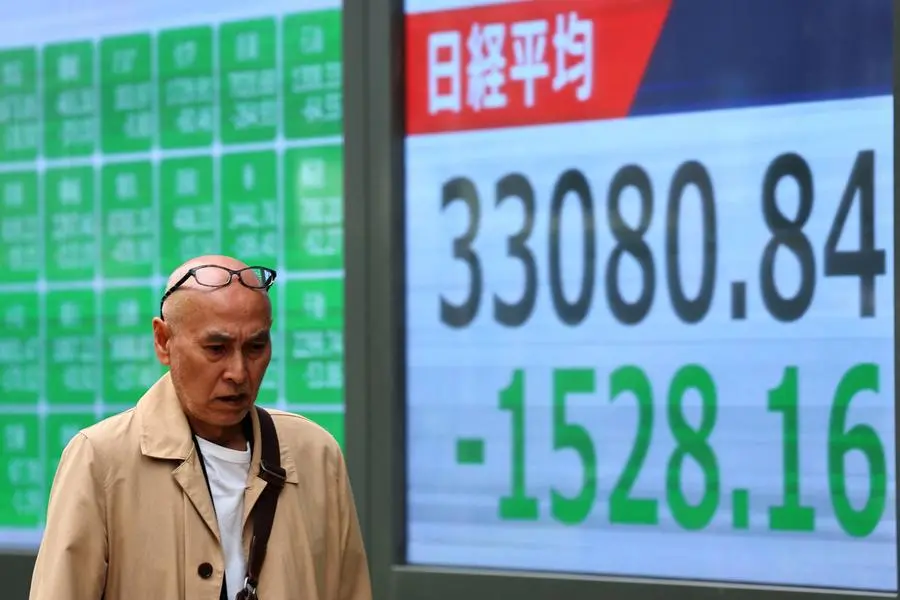PHOTO
U.S. shares were set to join a rally in Europe and Asia on Monday after the White House exempted smartphones and computers from U.S. tariffs, though gains were capped as President Donald Trump warned levies were still likely. Indeed, Trump on Sunday told reporters tariffs on semiconductors would be announced over the next week and a decision on phones made "soon".
On the face of it, the exemption of 20 product types accounting for 23% of U.S. imports from China was a boon to manufacturers.
But the news only gave a modicum of help to U.S. government bonds trying to recover from the bruising they suffered last week, and the dollar softened once more as the off-again, on-again trade policy gyrations left investors confused and analysts bearish on the long run.
"I think the likelihood that deals get agreed and lead to lower tariffs down the road has grown a bit, and I feel relatively good about the news flow," said Samy Chaar, chief economist at Lombard Odier.
"Still the risk scenario of things breaking down hasn't gone away, we're still worried about both the overall level of tariffs and also how long we remain with this uncertainty because that itself is causing damage."
"If you're a U.S. company, you've postponed hiring and capital expenditure, and I worry about when companies have to start cutting costs, that's the point you don't want to reach." Still, just the prospect of a pause was enough to lift S&P 500 futures 1.6%, while Nasdaq futures rose 1.8%. The S&P 500 rallied 5.7% last week, but was still more than 5% below where it was before what Trump calls "reciprocal" tariffs were first announced in early April.
The optimism was also felt in Europe and Asia, outperforming also because they missed the tail end of the bounce on Wall Street on Friday. Europe's broad STOXX 600 index rose 2.2%, having lost 2% last week, and MSCI's broadest index of Asia-Pacific shares outside Japan gained 1.5% after shedding more than 4% last week. Tech firms and the broader supply chain were the biggest gainers, up 2.8% in Europe, after giants in Apple's supply chain surged in Asia.
Apple's own shares jumped nearly 5% in premarket trading.
The market also has more earnings to weather this week. Goldman Sachs, on Monday said profit rose 15% in the first quarter, fuelled by stock traders who capitalized on volatile markets, while Bank of America and Citigroup are up later in the week.
Numbers from chipmaker TSMC will be a highlight given Trump's plan to investigate the entire global semiconductor supply chain. In terms of economic data, March numbers showed a 12.4% jump in Chinese exports as firms rushed in orders ahead of Trump's tariffs.
On the docket this week are U.S. retail sales and Chinese gross domestic product, while Federal Reserve Chair Jerome Powell speaks on the economic outlook on Wednesday, when he will almost certainly be quizzed on the prospect of rate cuts and the recent stress in the Treasury market.
NOT SO SAFE
U.S. Treasuries were trying to eke out a recovery with the 10-year yield down 6 basis points at 4.43%, but since it rose 50 bps last week, the largest weekly rise in borrowing costs in decades, any excitement at the news was fairly constrained. Notably last week's rise in yields came alongside a fall in the dollar, both safe havens like the yen and Swiss franc, but also the euro. The fall can be explained by overseas investors flooding out of U.S. assets to move back home, though some are asking broader questions.
"It is no longer hyperbole to say that the dollar's reserve status and broader dominant role is at least somewhat in question, even if the inertia and network effects that have kept the dollar on top for decades are not going away any time soon," said Jonas Goltermann, deputy chief markets economist at Capital Economics.
"The key questions are around the indirect damage done through generating extreme uncertainty around the policy and economic outlook, the ongoing dislocations in the Treasury market and, ultimately, undermining confidence in U.S. institutions and asset markets." Japanese officials are gearing up for trade negotiations with the United States that will likely touch on currency policy, with some officials privately bracing for Washington to call on Tokyo to prop up the yen.
They might not need to work too hard given the dollar had taken a beating from worries the erratic nature of Trump's trade policy was shaking investor faith in U.S. assets. On Monday, the dollar nudged a touch lower on the yen again after hitting a six-month low at 142.05 last week, and managed to squeeze out around a 0.4% gain on the Swiss franc to 0.8195, having shed more than 5% last week to the lowest in a decade. The euro was a touch firmer at $1.1382, just short of a three-year top of $1.1474, also hit last week. The European Central Bank meets on Thursday and is considered certain to cut rates by a quarter point to 2.25%.
Canada's central bank also meets this week, and markets imply around a one-in-three chance it might trim its 2.75% rates.
In commodity markets, global uncertainty was proving a windfall to gold prices which surged to all-time peaks at $3,245 an ounce on Monday.
Oil has had a much tougher time amid fears of a global economic slowdown and increased supply from OPEC, though it found some support from the risk of an end to Iran's exports. Brent was up 80 cents at $65.6 a barrel, while U.S. crude nudged up 80 cents to $62.32 per barrel.
text_section_type="notes">To read Reuters Markets and Finance news, click on https://www.reuters.com/finance/markets For the state of play of Asian stock markets please click on:
(Reporting by Wayne Cole; Editing by Jamie Freed, Jacqueline Wong, Toby Chopra and Shron Singleton)





















